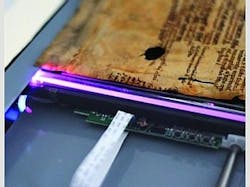Multispectral scanning reveals hidden detail in old documents
A multispectral scanner the size of a desktop scanner has been developed at the University of Oxford’s (Oxford, UK) Faculty of Classics. It is now being commercialized by a new company, Oxford Multi Spectral, which was spun out this week by the University’s technology transfer company Isis Innovation (Oxford, UK).
The scanner was developed for imaging ancient papyri and the technology has been used to successfully scan, restore, and archive more than a quarter of a million historically significant manuscripts.
Oxford Multi Spectral Limited (OMS) will focus on the applications in restoring manuscripts and art, as well as the huge potential market for detecting forged security and border control documents, bank notes, and forensic evidence.
Paul Westwood, the managing director of Forensic Document Services, the biggest forensic document company in the Asia Pacific, explains that the Oxford scanner could be used to analyze a huge variety of samples, including crime scene samples such as counterfeit and altered documents, as well as documents bearing erased or faded entries and signatures.
Current multispectral imaging kits are large, expensive, and need specialized operators. The Oxford multispectral scanner, on the other hand, uses flat-bed scanner technology and image-processing software to scan and analyze visible and invisible features that absorb and reflect light at different wavelengths such as inks, pigments, polymers, or papers.
Dirk Obbink, Oxford University Lecturer in Papyrology and head of the research group that developed the scanner, says, "We can take digital images at different wavelengths of the light band and layer them on top of each other, using software to analyze them. We can set the equipment to interrogate a feature we are interested in -- the surface structure, fibers, stains, watermarks, fingerprints, or alterations. We can detect an artist or writer’s signature under multiple layers of paint or the pencil sketch under a watercolor."
OMS has secured an investment of £250,000 from a Chinese investor Changsha Yaodong Investment Consulting and its UK based partner RTC Innovations (Birmingham, UK) to commercialise, manufacture and market the scanners globally. It received £47,600 from Oxford University’s Challenge Seed Fund last year to perform prototyping work.
-- Posted by Vision Systems Design
